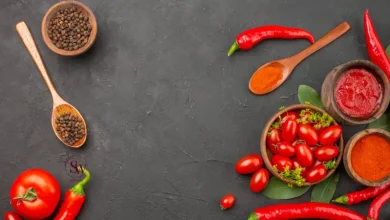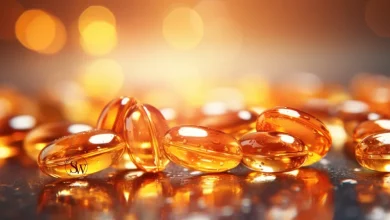What is a Good High Protein Diet?
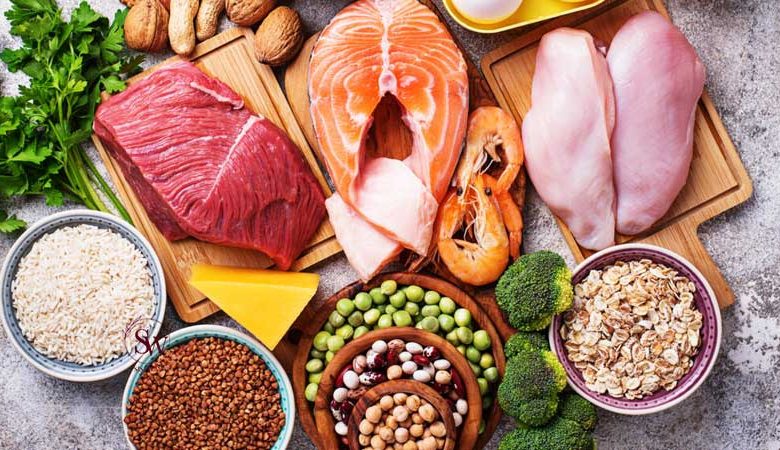
In the pursuit of a healthier lifestyle, many individuals are turning to high-protein diets as a key component of their nutrition regimen. The benefits of a diet rich in protein are well-documented, ranging from muscle development and weight management to improved satiety and overall well-being. In this comprehensive article, we will delve into the intricacies of what constitutes a good high-protein diet, backed by evidence from reputable sources.
Understanding the Basics
To embark on the journey of a high-protein diet, it’s essential to comprehend the fundamentals. Proteins are vital macronutrients made up of amino acids, which serve as building blocks for various bodily functions. Unlike fats and carbohydrates, the body does not store protein, making a consistent intake necessary for maintaining optimal health.
Protein Sources
The cornerstone of any high-protein diet is a diverse selection of protein-rich foods. Sources such as lean meats, poultry, fish, eggs, dairy products, legumes, and plant-based alternatives like tofu and tempeh offer a spectrum of amino acids essential for bodily functions. Exploring these options ensures a well-rounded and balanced protein intake.
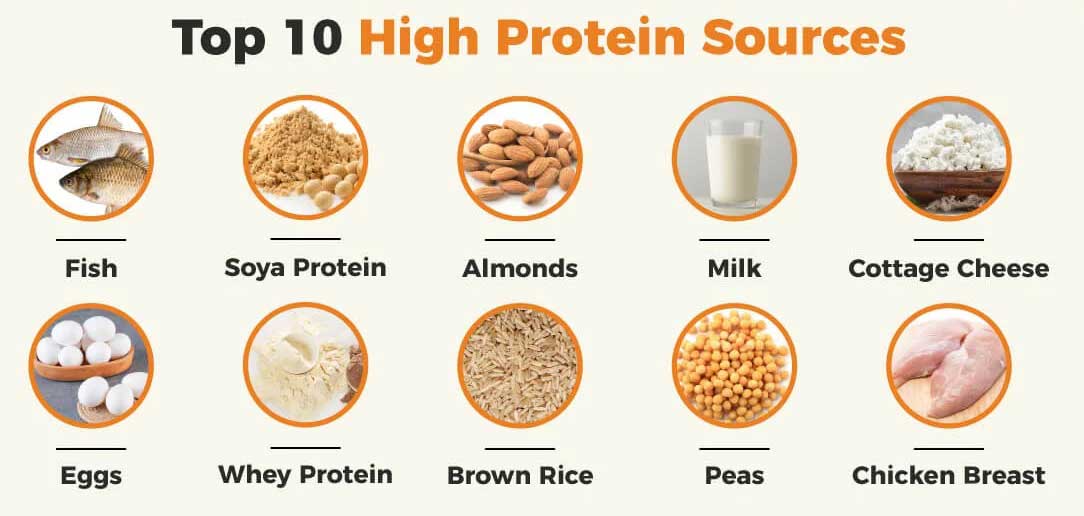
Calculating Protein Requirements
Individual protein needs vary based on factors such as age, gender, activity level, and health goals. According to the Dietary Guidelines for Americans, a general recommendation is 0.8 grams of protein per kilogram of body weight. However, those engaged in regular exercise or aiming for muscle growth may require higher amounts, often ranging from 1.2 to 2.2 grams per kilogram.
| Age Group | Gender | Protein Requirement (g/kg/day) |
|---|---|---|
| Infants | Both | 1.2 – 1.5 |
| Children 1-3 years | Both | 1.05 – 1.2 |
| Children 4-13 years | Both | 0.95 – 1.2 |
| Adolescents 14-18 years | Males | 0.85 – 1.2 |
| Adolescents 14-18 years | Females | 0.85 – 1.0 |
| Adults 19-70 years | Males | 0.8 – 1.0 |
| Adults 19-70 years | Females | 0.8 – 1.0 |
| Older Adults (>70 years) | Both | 1.0 – 1.2 |
| Pregnant Women | – | 1.1 – 1.2 |
| Lactating Women | – | 1.2 – 1.4 |
Health Benefits of a High-Protein Diet
Muscle Development and Maintenance
Protein plays a crucial role in the synthesis and repair of muscle tissues, making it indispensable for those engaged in physical activities. Adequate protein intake promotes muscle growth and helps prevent muscle loss, particularly during weight loss efforts.
Weight Management and Satiety
A high-protein diet has been linked to increased feelings of fullness and reduced overall calorie intake. This satiating effect can be beneficial for weight management, aiding in both weight loss and weight maintenance.
Metabolic Health
Research suggests that a high-protein diet may positively impact metabolic health by promoting fat loss while preserving lean body mass. It can also contribute to improved insulin sensitivity, potentially reducing the risk of type 2 diabetes.
Implementing a High-Protein Diet
Meal Planning and Timing
Effective implementation of a high-protein diet involves strategic meal planning and distribution throughout the day. Distributing protein intake evenly across meals can optimize muscle protein synthesis and enhance the diet’s overall effectiveness.
Hydration Considerations
Increased protein intake may necessitate higher water consumption, as the body requires adequate hydration to process and eliminate byproducts of protein metabolism. It’s crucial to maintain a well-hydrated state while adhering to a high-protein diet.
Potential Challenges and Considerations
Kidney Health
There has been longstanding concern about the impact of high-protein diets on kidney function. However, current evidence suggests that individuals with healthy kidneys are unlikely to experience adverse effects. Those with pre-existing kidney conditions should consult with a healthcare professional before adopting a high-protein diet.
Nutrient Balance
While focusing on protein intake, it’s important not to neglect other essential nutrients. A well-balanced diet that includes a variety of fruits, vegetables, whole grains, and healthy fats ensures comprehensive nutritional support.
Three Recipes of the Popular High Protein Diet
Grilled Chicken Salad:
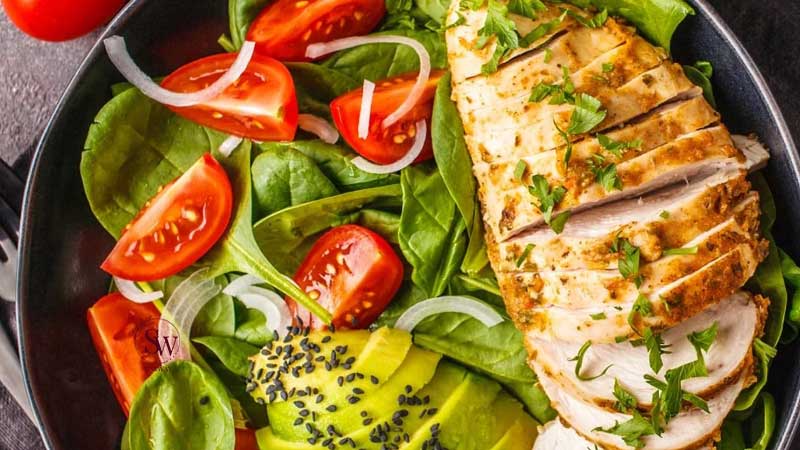
-
- Ingredients:
- 1 lb boneless, skinless chicken breasts
- Mixed salad greens (spinach, arugula, lettuce)
- Cherry tomatoes, halved
- Cucumber, sliced
- Red bell pepper, sliced
- Avocado, diced
- Olive oil
- Lemon juice
- Salt and pepper to taste
- Ingredients:
-
- Instructions:
- Season the chicken breasts with salt and pepper.
- Grill the chicken until fully cooked, about 6-8 minutes per side.
- In a large bowl, combine the salad greens, cherry tomatoes, cucumber, bell pepper, and avocado.
- Slice the grilled chicken and place it on top of the salad.
- Drizzle olive oil and lemon juice over the salad as a dressing.
- Toss everything together and serve.
- Instructions:
Quinoa and Black Bean Bowl:
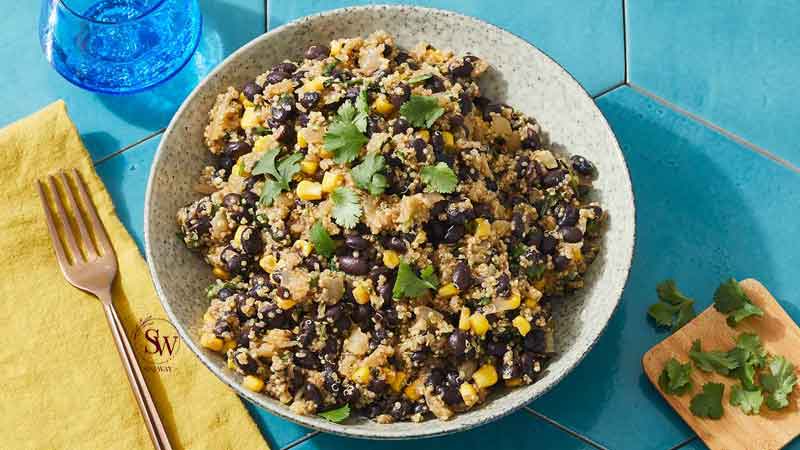
-
- Ingredients:
- 1 cup quinoa, cooked
- 1 can black beans, drained and rinsed
- 1 cup corn kernels
- 1 cup cherry tomatoes, halved
- 1/2 red onion, finely chopped
- 1 avocado, diced
- Fresh cilantro, chopped
- Lime juice
- Salt and pepper to taste
- Ingredients:
-
- Instructions:
- In a large bowl, combine cooked quinoa, black beans, corn, cherry tomatoes, red onion, and avocado.
- Toss the ingredients together gently.
- Drizzle lime juice over the bowl for added flavor.
- Season with salt and pepper to taste.
- Garnish with fresh cilantro and serve.
- Instructions:
Salmon and Asparagus Foil Packets:
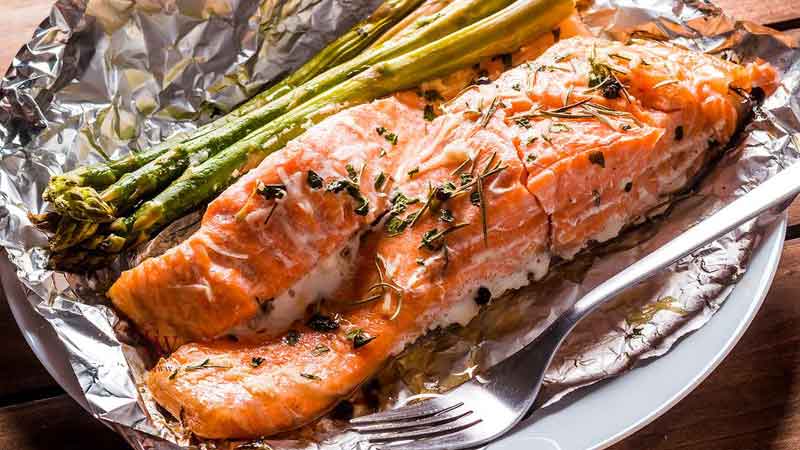
-
- Ingredients:
- 4 salmon fillets
- 1 bunch asparagus, trimmed
- 2 tablespoons olive oil
- Garlic powder
- Lemon slices
- Salt and pepper to taste
- Fresh dill for garnish
- Ingredients:
-
- Instructions:
- Preheat the oven to 400°F (200°C).
- Place each salmon fillet on a piece of foil large enough to wrap the fish and asparagus.
- Arrange asparagus spears around the salmon fillets.
- Drizzle olive oil over the salmon and asparagus.
- Season with garlic powder, salt, and pepper.
- Place lemon slices on top of each salmon fillet.
- Wrap the foil tightly around the salmon and asparagus, creating packets.
- Bake in the preheated oven for 15-20 minutes or until the salmon is cooked through.
- Garnish with fresh dill before serving.
- Instructions:
These recipes are not only delicious but also rich in protein, making them great choices for a high-protein diet. Adjust portion sizes based on your specific dietary needs and goals.
Also Read: Women’s Diet for Abs
- Athletes and Fitness Enthusiasts:
- Protein is essential for muscle repair and growth, making it crucial for athletes and those engaged in regular physical activity. High-protein diets can help support muscle recovery, improve athletic performance, and maintain overall health.
- Bodybuilders:
- Bodybuilders often follow high-protein diets to promote muscle hypertrophy (increase in muscle size). Protein is a key component in the synthesis of new muscle tissue, and a higher protein intake may support the demands of intense weight training.
- People Engaged in Weight Loss or Fat Loss Programs:
- Protein can help with weight loss by promoting a feeling of fullness, reducing overall calorie intake, and preserving lean muscle mass. A high-protein diet can be beneficial during weight loss to prevent muscle loss and support fat loss.
- Older Adults:

- As people age, there is a natural decline in muscle mass and function. Adequate protein intake becomes crucial for maintaining muscle mass, bone density, and overall strength. High-protein diets can be beneficial for older adults to support healthy aging.
- Pregnant and Breastfeeding Women:
- Protein is essential for the development of the fetus during pregnancy and for providing nutrients through breast milk during breastfeeding. Pregnant and breastfeeding women may need increased protein intake to support the growing needs of both the mother and the baby.
- Individuals Recovering from Illness or Surgery:
- Protein plays a vital role in the recovery process after illness, surgery, or injury. It helps in tissue repair and immune function, making a high-protein diet beneficial for those going through recovery.
- Vegetarians and Vegans:
- People following vegetarian or vegan diets may need to pay special attention to their protein intake, as plant-based sources may have lower protein content compared to animal products. Including a variety of plant-based protein sources can help meet protein requirements.
- Individuals with Certain Medical Conditions:
- Some medical conditions, such as diabetes, may benefit from a higher protein intake to help manage blood sugar levels. Always consult with a healthcare professional or a registered dietitian before making significant dietary changes based on specific medical conditions.
FAQ
- Can a high-protein diet help with weight loss?
Yes, a high-protein diet has been associated with increased feelings of fullness, reduced calorie intake, and improved weight management. - Are there risks associated with a high-protein diet and kidney health?
Current evidence suggests that individuals with healthy kidneys are unlikely to experience adverse effects. However, those with pre-existing kidney conditions should consult with a healthcare professional. - How can I calculate my protein requirements?
A general recommendation is 0.8 grams of protein per kilogram of body weight. However, individual needs vary based on factors such as age, gender, activity level, and health goals.
Conclusion:
In conclusion, a well-designed high-protein diet can be a valuable asset in achieving and maintaining optimal health. By understanding the basics, reaping the health benefits, and navigating potential challenges, individuals can embark on a nutritional journey that aligns with their fitness and wellness goals. Always consult with a healthcare professional or nutritionist to tailor a high-protein diet to your specific needs and circumstances.

